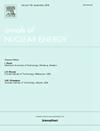Investigation of a hybrid neural network framework for CHF prediction in a wire-wrapped rod bundle
IF 2.3
3区 工程技术
Q1 NUCLEAR SCIENCE & TECHNOLOGY
引用次数: 0
Abstract
While predicting critical heat transfer in rod bundles is crucial for reactor safety analysis, most of the existing methods fall short in achieving a balance between accuracy and generalization. Utilizing machine learning algorithms, the hybrid neural network framework was applied to explore prediction methods for critical heat transfer in a wire-wrapped rod bundle. It is concluded that the improvement of the prior model will lead to a better estimation result. Besides, with a larger size, the neural network will certainly improve the estimation performance, but it tends to sacrifice the mean of the data to optimize the variance. The hybrid prediction method, moreover, also has a satisfactory error characteristic at different neural network sizes. Besides, the learning preference of the neural network was also analyzed to elucidate the advantages of hybrid prediction methods. This study proposes and verifies an improved scheme for critical prediction methods which has an outstanding prediction performance over traditional fitting and standalone FCNN. Work facilitates the application of machine learning algorithms in thermal–hydraulic engineering..
混合神经网络框架在线束缠绕杆束CHF预测中的应用研究
虽然预测棒束临界传热对反应堆安全分析至关重要,但现有的大多数方法都无法在准确性和通用性之间取得平衡。利用机器学习算法,将混合神经网络框架应用于探索线包棒束临界传热的预测方法。结果表明,对先验模型进行改进可以得到更好的估计结果。此外,在更大的规模下,神经网络肯定会提高估计性能,但它往往会牺牲数据的均值来优化方差。此外,混合预测方法在不同神经网络规模下也具有令人满意的误差特性。此外,还分析了神经网络的学习偏好,说明了混合预测方法的优越性。本文提出并验证了一种关键预测方法的改进方案,该方案比传统的拟合和独立的FCNN具有更好的预测性能。工作促进了机器学习算法在热工水力工程中的应用。
本文章由计算机程序翻译,如有差异,请以英文原文为准。
求助全文
约1分钟内获得全文
求助全文
来源期刊

Annals of Nuclear Energy
工程技术-核科学技术
CiteScore
4.30
自引率
21.10%
发文量
632
审稿时长
7.3 months
期刊介绍:
Annals of Nuclear Energy provides an international medium for the communication of original research, ideas and developments in all areas of the field of nuclear energy science and technology. Its scope embraces nuclear fuel reserves, fuel cycles and cost, materials, processing, system and component technology (fission only), design and optimization, direct conversion of nuclear energy sources, environmental control, reactor physics, heat transfer and fluid dynamics, structural analysis, fuel management, future developments, nuclear fuel and safety, nuclear aerosol, neutron physics, computer technology (both software and hardware), risk assessment, radioactive waste disposal and reactor thermal hydraulics. Papers submitted to Annals need to demonstrate a clear link to nuclear power generation/nuclear engineering. Papers which deal with pure nuclear physics, pure health physics, imaging, or attenuation and shielding properties of concretes and various geological materials are not within the scope of the journal. Also, papers that deal with policy or economics are not within the scope of the journal.
 求助内容:
求助内容: 应助结果提醒方式:
应助结果提醒方式:


